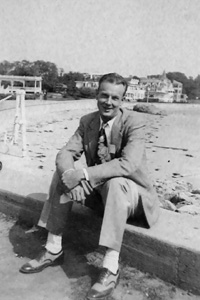Chapter 1 >
Autobiography home >
NF-104 home

Chapter 1 -
Training for War click on the links below for more of the story...
|
||||||||||||||
Prelude
I made my first landing December 11, 1928 in Washington, D.C. where I resided with my Mom, Jeannette and Dad, Robert in a 3rd floor walk-up apartment, Number One Dupont Circle, until I completed second grade at Force Elementary School. My mother was a Registered Nurse, having graduated from the same hospital in which I was born. Dad worked in the headquarters of the Southern Railroad, starting at the ripe old age of 14, in order to leave a very demeaning life in an Orphan Asylum. His divorced mother did not have money to support him. Those institutional memories remained vividly with him during his 86 years, in spite of which he remained attentive to both (divorced) parents throughout their later lives. I would visit my maternal grandmother in my early years but didn’t see the grandfather until I was 20. By then he had married frequently and stayed very fit and debonair, yet died of heart failure at the age of 62, looking forward to his eighth wedding. Although he was a handsome and affable man, his admission to me that he never paid alimony negated my natural wish to respect him. My memories of that earlier era are sparse at best, but include the sight of a man and his motorcycle being hurled above a street lamppost of Dupont Circle as the accident from our third level apartment. Another recollection at about 5 was of my father, at 6’ 2”, climbing between windows, three stories high, to recover my cousin Tiji, slang for Little Jean in Haiti where she was born. She had locked herself into our bathroom and all efforts to open the door failed. The exciting part was that the windows were at 90 degrees to each other, and the ironing board, upon which he crawled, barely reached and bent from his weight, teetering 3 floors over the ground. Two other memories were incidences with dogs, wonderful friends for whom I have always retained a great love and empathy. The excitement of taking a bone from a strange dog, because its little mistress wished it so, resulted, I surmise, from a desire for recognition or premature manliness tendencies, I prefer to think. I garnered attention from my mother and the other parents, as they tended to my dog-bite. The bite didn’t mean much, but the notoriety apparently did. I remembered it! The second case was absolutely contrary in emotions, after I spied the grizzly sight that a playmate and I had caused the crushing death of my little dog and my personal shadow, “Flopsy”, as we ran back and forth inside a two-wheel trailer, which lay in a lot next to our apartment. This was my first encounter with utter grief and raw guilt. Not much more survived in memory except for ‘Mutiny on the Bounty’ my first movie. It scared me so bad my conduct forced Dad and Mom to exit the theater, much to his displeasure and I never went to a movie again, until I was fourteen. What a whimp! The depression cranked on and we moved into an ‘old country’ atmosphere, Seneca, MD, where the prime forms of transportation were rowboats, Ford Model A’s and even a Model T. (I wonder what Henry Ford did with the intervening 19 models.) That world became my oyster, while Dad, in his slightly more modern auto commuted daily to downtown Washington. From his start as office boy, I am proud of the fact he retired as Treasurer of the Southern Railway System with only night school education and experience to guide him. I was 8 at the time, going to a 2-room school when a kind man, one of the week-end regulars from the cities, put me in charge of tending his little speed boat of very light airplane construction, with use privileges as compensation. My folks bought me a ¾ horsepower Elto-Pal outboard motor, my baby-sitter, and with my weight the thing would get up to speed on its aquaplane. A short cruise down the sizeable Seneca Creek and under the huge aqua-duct over the old C&O canal and I was cruising alone on the Potomac River for miles of excitement; exploring such hidden treasures as an abandoned old bootleggers’ hangout on an island, with trees still fitted with lookout towers, plus an old whiskey still in the basement and equipment scattered throughout the house. A summer day could include finding ancient Seneca Indian artifacts in the miles of cornfields across the river in Virginia, or catching crawfish at the river’s rapids for fishing. I even had a summer business of selling minnows, which I netted in front of our cottage. And winter, at its best, found us ice-skating on the creek.
Grandpa Albaugh, once the Sheriff of Frederick, made sure I would be safe from the start! He took me out in our rowboat and pushed me into Seneca Creek’s deep, slow moving water. Maybe he was getting even for some of my pranks, like a certain snowball! He convinced me enough that he meant business that I naturally dog-paddled as he man-paddled the boat just out of my reach. I never became a great swimmer, but that lesson definitely saved my life in a boating mishap more than 30 years later. My most lasting memory of school was the punishment routine in our two- room schoolhouse. Our teacher alternated in selection of an individual designated to “cut a switch from the willow”, whenever a transgressor was to be redressed for some dastardly deed. Her promise to her appointee was that bringing back an undersized selection would make the cutter its first victim. It worked and switch selection was a good object lesson in the art of compromise and logic, since next time you could be the victim with the table turned.
My folks divorced and I was moved to York, PA to live with my Aunt Edie and Uncle Mervin “Turk” Myers and daughter Patsy, who became my surrogate sister. Patsy spoiled me more than anyone, sometimes ceding her savings on my request. I went from 4th grade through 9th with them and after enduring an initial period of feeling deserted, I had a wonderful and happy life. No son could every have been treated more kindly and fairly than I was. I had my ups and downs. One memorable downer was in 8th grade when one of my buddies found a prophylactic at home, and blew it up on the school bus and three of us batted it around, including many of the naive young ladies, one of whom took it home. We lived in the county suburb of Grantley, completely on the other side of York from our junior high. I was dismissed from my elected post as school vice president and the three of us had to ride our bikes to school for a month. But there was a memorable up side, associated with my playing basketball on the school varsity team, with my best pal Billy Westlake. We were playing one of the biggest schools inside the city, Phineas Davis, and had never in history beaten them. I was our top scorer, a guard, averaging all of 8 points per game... Couldn’t have made water-boy against today’s youngsters. P.D. scored and the game was tied, with only seconds to go. Billy took the ball out full length of the court and threw it to me. I dribbled just to mid-court as the clock ran down and heaved it with both hands, the standard set shot of the time, even in college ball. I had to squat to the floor and us my legs to send it that far and luckily it banked through the hoop, scoring right on my average for an 18 to 16 win. When I went to Church on Sunday, I got my 15 minutes of fame in downtown York, no less, plus a newspaper clipping to send my Mom. She saved records of my youth, including that one.
Summers we sometimes spent at a cabin on Chesapeake Bay where the Lucketts, my Uncle George and Aunt Kay and cousin Nancy lived. That was the starting point of my dream to be a pilot. I recall talks with George who joined the Navy as a young man and became a self-taught Naval Aviator in 1919. At first he was an airplane mechanic and his only pilot training was to climb in and taxi on the water until he summoned courage to take-off and quickly drop back on the water, as a beginning. He told me how he made his first turns barely above the waves by side-slipping turns, being too afraid to climb higher and not daring to bank the wings. After some years as a pilot, the Navy formalized the process and he had to attend flying school. He had a young instructor with less experience than he, who gave him a very bad time and once told him to do a “tail-spin” after a lot of vocal abuse. George put it in a spin, sitting in the rear seat, then released the controls and let it continue. The instructor began screaming at him to recover, while uncle sat with his arms resting on the sides of the cockpit. The instructor turned about and saw him making no effort to recovery at low altitude, so had no choice but take over the controls and recover. After landing, the outraged instructor inquired about him sitting there with his arms spread instead of flying, Uncle George said he “intended to tear his guts out as they hit the ground,” Some things never change in a bureaucracy, but he got his license as the 19th U.S. Naval Aviator. That was in the 1930’s when I would see him fly out of Annapolis Naval Air Station. I could watch those exciting little bi-plane fighter airplanes dog fight and hear stories from him and shipmates about their adventures. I never forgot a long lost photo of him, in the early days, high over the ocean and dressed only in bathing shorts while hanging from the wing spar, with nothing but ocean below and holding on with one arm while waving to the other pilot, who also doubled as photographer. I was impressed even then, and I didn’t know anything about the risks of sudden turbulence. Two of my playmates during those summers were the sons of George’s squadron mate, Cokie Joe Hoffman. Cokie Joe was a favorite with kids, since he was playful and happy go lucky; fun for us, and his two little boys were my playmates. Before America joined in the war, Cokie Joe was one of the first to volunteer for Gen. Chennault’s Flying Tigers and went to war in China. He was killed in action, but not before gaining air victories against Japan’s most experienced pilots. I was very impressed when my uncle and another aviator landed on York’s grass airstrip in a Navy trainer. It was the closest I had ever been to an airplane landing, except my models. When we drove them back the next day, I watched them start the engine, taxi and take-off, forming a lasting memory. I can recall how the other pilot stood on the wing and inserted a handle in the fuselage, and began cranking. Upon his signal my Uncle George engaged the propeller and started the engine. I learned that an inertia wheel starter had replaced the manual cranking of propellers. Years later, 1958, I had one of the memorable moments of my life and was repaid in kind by Uncle George when he proudly watched me successfully shoot down a small airplane towed behind a B-57 jet with the guns of my F-100 fighter during a major firepower demonstration. He lived to a ripe old age. I enjoyed a last stay with him and Aunt Kay where they visited Martha and me in New Orleans many years later.
Mom had tried to get me to move to Hawaii when she remarried but I had all my interests and friends in York and objected. To make my point, I threatened to run away, a rather neat trick from Hawaii. When the Japanese had attacked Pearl Harbor on a Sunday morning, Mom and husband Warren “Pappy” Elder, were enjoying sunrise at the beach. A sailor, he soon departed on the Repair Ship Medusa and was on it until wars end without leaving the islands of the Pacific. Family members were sent home by boat and Mom located in California to be near when he returned. She came to York to visit me occasionally during the war. At the beginning of summer break after 9th grade, I decided to ride a Greyhound bus to Long Beach and visit her. Among my interests was seeing Hollywood, since I had finally become a movie fan.
I enjoyed the “fast life” of the west coast and remained in Long Beach through 10th grade. Pappy returned home just at the end of the school year and was stationed at Alameda Naval Air Station, near Oakland CA. I moved there and discovered what a great guy he was, and no one could have been a finer friend. I finished high school and a year of college. Pappy proved to be a wonderful gentleman, a great friend. Quite a few Sailors, the folks who had endearingly named “Pappy”, came out of their way to see him one last time, obviously a testimony to the man I grew to love in my three years with them and many years together in the future. This man would be my children’s beloved ‘Pappy’ in my future. During summer break I decided to visit my Dad, then a bachelor, in Washington, DC. I enjoyed entering the more adult lifestyle with new interests and transferred from U. of California to George Washington University.
My girlfriend, Martha Yacko, and I fell in love and married. She and I both worked about a block from the White House. My Uncle Jack, a retired Marine Master Sargeant, helped me get a summer job in the U.S. Treasury Department. My early dream of becoming a pilot had vanished somewhere in the past but reemerged with news of a big political battle raging between the Air Force, with its huge B-36 bomber and the Navy’s flying boat advocates. My urge was rekindled and I envisioned flying a huge bomber when I discovered that the Air Force was looking for pilot candidates and had just opened it up to married men with at least two years of college. I passed all tests and was accepted and sworn in as a U.S. Air Force Flight Cadet. Meanwhile, Martha and I were to discover that our new family would gain a third member. Dad gave us a really old Plymouth and we headed for Wichita, where Martha would live with Pappy and Mom for the next 12 months. We stopped to visit a friend in Ft. Smith, AK when Martha suddenly got extremely ill with a kidney infection and entered critical care. She is seldom ill and is a fast healer, but life was touch and go for her. She recovered enough for me to drive her to Tulsa for a DC-3 airplane to Wichita. I drove to Wichita with a few days to spare, during which I hired my first flight in an airplane. Me, the kid who never even would get on rides at amusement parks and didn’t go to his second movie until 14, was on my way to flight training and didn’t want to have to admit I never was in an airplane, should they ask me. I departed for Texas in time to avoid AWOL in my first assignment. |
| next section |
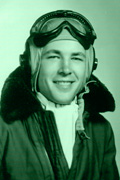
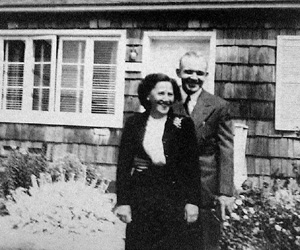
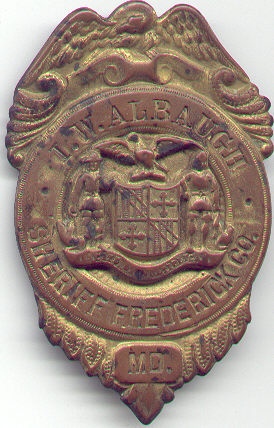
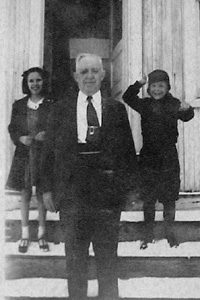
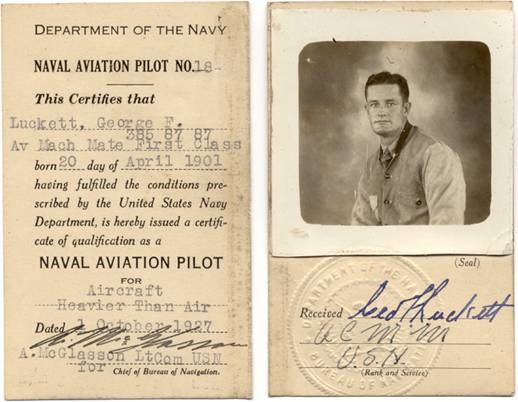
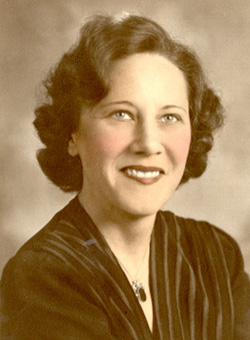
.jpg)
